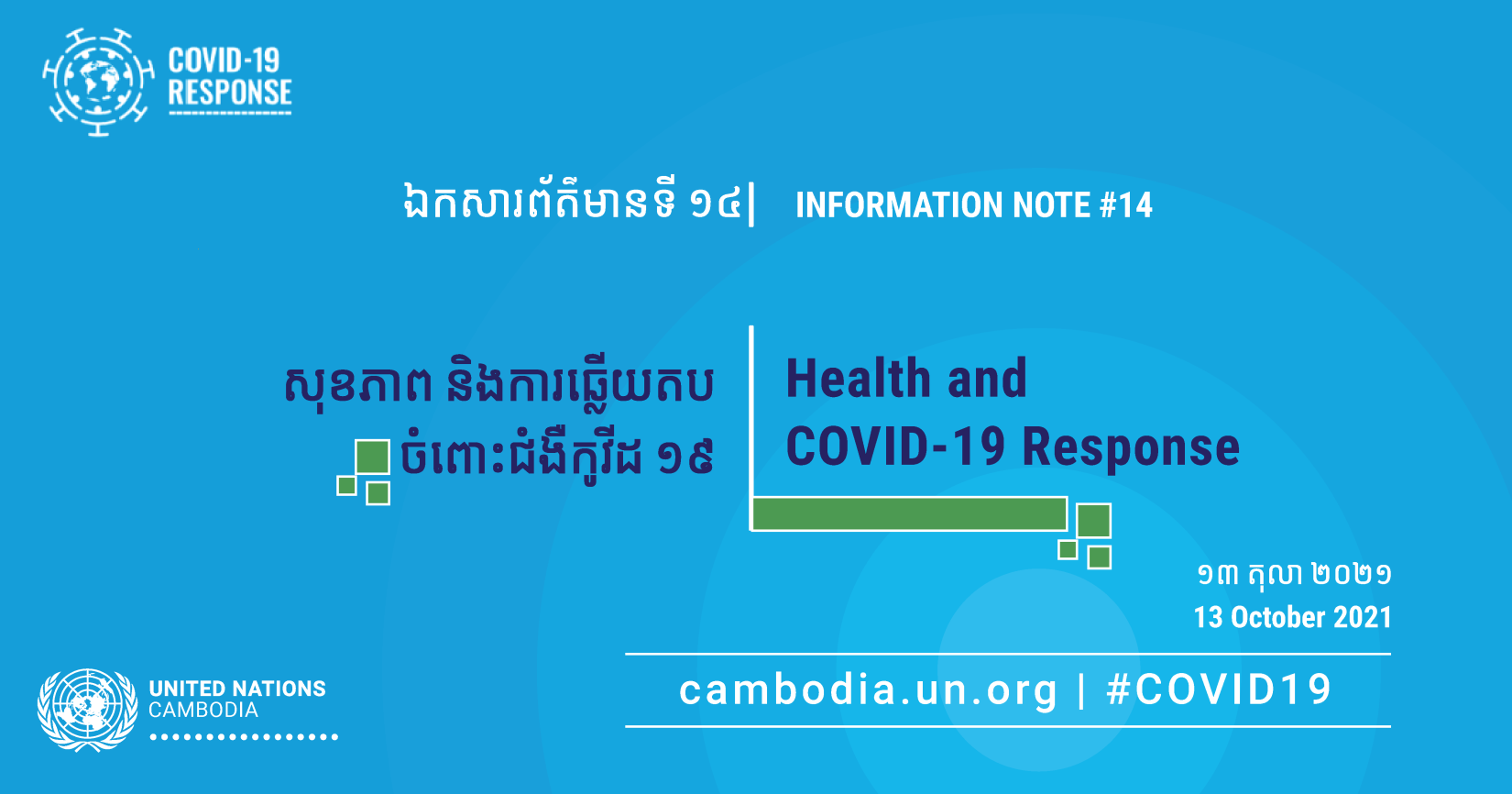Information Note #14: Health and COVID-19 Response
13 October 2021

The pandemic in Cambodia has disrupted all aspects of society, including the physical, mental, and social well-being of its communities. More than 115,335 cases and 2,544 deaths have been reported. The challenges responding to the pandemic are similar across countries: increasingly transmissible variants; transmission among young, healthy, mobile adults that make the virus difficult to detect and contain; challenges in full compliance with effective public health and social measures, pandemic fatigue; vaccine optimism. These challenges, however, have also brought opportunities to the Cambodian health system and beyond, and the investments in these opportunities will ripple for years to come.
The Royal Government of Cambodia (RGC) is taking the opportunity to work for the future by investing in the health security system to ensure both a stronger response and a more prepared, resilient system. The United Nations commends RGC commitments to promote public health and has supported it throughout the pandemic with policy advice, technical cooperation in line with the WHO technical guidelines, coordination of partners and agencies, training and procurements. Below are some examples.
To improve early detection of SARS-CoV-2, the virus that causes COVID-19, working partners, the United Nations has supported the Ministry of Health (MOH) to expand laboratory diagnostic capacity with technical advice, testing strategies, training, and procurement (more than USD$2 million). By September 2021, 12 laboratories could test 12,000 samples per day, compared with one laboratory and 500 samples per day in February 2020. The National Institute for Public Health now conducts whole-genome sequencing for SARS-CoV-2, in addition to Institute Pasteur du Cambodge. These investments will advance the country’s ability to detect new variants of SARS-CoV-2 and other novel pathogens that may emerge.
The United Nations with development partners supported MOH to strengthen local capacity for detecting transmission in the field, assessing risk, and responding to outbreaks. Approximately 3,000 Rapid Response Team (RRT) members were trained in 2020 on COVID-19, almost two dozen came from their provinces to the national contact tracing team in February–July 2021 to support the response and participate in four-to-six-week on-the-job training at the Communicable Disease Control Department (MOH). These trained RRT members now serve as contact tracing and surveillance leads in their provinces.
As RGC rapidly expanded treatment facilities throughout the country, including large regional centres, United Nations Cambodia procured critical supplies, such as PPE (USD 1.8 million) and essential medicines and equipment for oxygen support (USD 820,000) to aid that expansion. In addition, it assisted capacity-building efforts for frontline healthcare workers, including critical care providers, in clinical management and Infection, Prevention and Control (IPC) measures. The United Nations with MOH brought national clinicians together through regular virtual calls for experience sharing, which leveraged the experience that local clinicians gained managing COVID-19 early in the epidemic to prepare those who had not yet faced it.
The United Nations joined RGC in its embracing of community engagement as an essential approach to facing COVID-19. In May and June 2021, the joint MOH-WHO missions facilitated dialogue sessions with provincial health directors and provincial governors to learn about their experiences fighting COVID-19, identify success stories and adjust response plans. The findings led to modified non-pharmaceutical interventions (NPIs) and a national campaign to empower families and communities to make decisions that protect lives and livelihoods. The UN also has trained and supported community members, Village Health Support Groups and village leaders across rural and vulnerable migrant communities to raise awareness of COVID-19 preventive measures in their communities, including promoting the uptake of COVID-19 vaccination, contributing to reducing the risk of community transmission.
Although efforts have focused on COVID-19, the United Nations has also worked alongside national partners and communities to ensure that essential and basic health services for all are not disrupted. Support for the National Center for HIV/AIDS, Dermatology and STD to adopt and expand innovative and agile approaches to minimize the disruption of needed services for people living with HIV and key populations community. Disruption of treatment services for people living with HIV has remained at less than 10% compared to the pre-pandemic period. Childhood vaccination coverage nationally for non-COVID vaccines have remained on track, however, there are low coverage areas in some hard to reach and high-risk communities that require close monitoring and support at local levels. The UN will work with health sector partners to continue monitoring and analysing the continuity of essential health services, including the coverage and work with local authorities and communities to address barriers.
To prevent importation and support returning migrant workers, a 2020 UN programme improved access to COVID-19 preventive measures and screening for returning migrants at points of entry and quarantine centres. The programme supported the provision of essential health and social services, such as maternal and newborn care, gender-based violence support, and mental health and psychosocial support. The programme also provided information on COVID-19 prevention and public health measures to returning migrants, as well as guidance on accessing essential health and social services. The United Nations has also worked with the Department of General Immigration to train border officials on health-compliant border management procedures and on performing duties while minimizing the risk of transmission.
To date, Cambodia has vaccinated more than 98% of people 18 years of age or older with at least one dose, making it one of the most vaccinated countries globally. UN support for this effort has been detailed in 3 August 2021 UN Information Note #11. Nevertheless, it is not the time to let down our guard. The Delta variant is more transmissible than previous variants and has resulted in explosive outbreaks and overwhelmed hospitals in other countries. Ongoing transmission brings the threat of new variants arising at any time. The UN urges continued investment in provincial surveillance and response systems to enable provinces to detect cases more quickly and respond to clusters with targeted, localized measures, which will help minimize economic and social disruptions. This investment should include better data availability and management in the provinces with disaggregated data to assess the coverage of essential health services, especially for the at-risk, vulnerable, and marginalized individuals. The United Nations encourages prioritizing efforts to ensure 100% of the vulnerable, elderly, and those with underlying health conditions are fully vaccinated to save irreplaceable lives and prevent overwhelmed healthcare systems and hospitals. The United Nations advocates continuing support on risk communication and community engagement to safeguard the gains made in empowering families and communities to make decisions that save lives and livelihoods.
The United Nations calls for respect for all human rights for the success of the public health response. While it is critically important to provide immediate health response to mitigate the risk of COVID-19 transmission, the United Nations promotes human rights and gender-based strategy as part of its support to public health. It calls on the authorities to promote equality and address non-discrimination, which includes addressing pre-existing barriers to access to health and make the treatment and health services available for those who lack means of payment. The United Nations further calls the authorities to rebuild public health policy towards universal health coverage that is grounded on human rights where everyone is empowered, informed and engaged.
Health is an investment that should not be considered a cost. We have learned from the COVID-19 pandemic that health is a fundamental and indistinguishable part of society, not a luxury. If health is at risk, everything is at risk. Governments must prioritize strengthening healthcare capacity and public health systems—to invest now for a safer, healthier future. To build back better, governments must also use this opportunity to implement transformational policies, such as Universal Health Coverage, and sustainable financing for health to ensure resilient health systems. The United Nations commends the Royal Government for prioritizing this and will continue to support it in doing so.
###
UN Cambodia’s Response to COVID-19 Information Notes is official documents from the United Nations in Cambodia intended for the media and other partners. They are prepared by the Office of the UN Resident Coordinator.



















